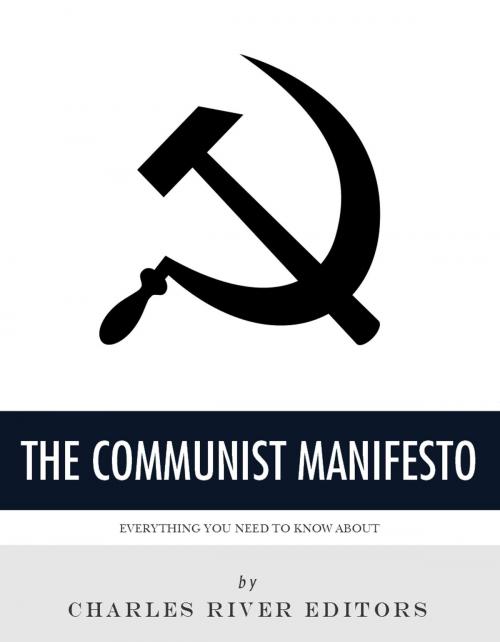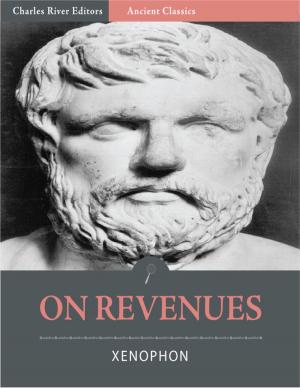Everything You Need to Know About The Communist Manifesto
Nonfiction, Social & Cultural Studies, Political Science, Government, Communism & Socialism, Reference & Language, Study Aids| Author: | Charles River Editors | ISBN: | 9781475320916 |
| Publisher: | Charles River Editors | Publication: | January 6, 2013 |
| Imprint: | Language: | English |
| Author: | Charles River Editors |
| ISBN: | 9781475320916 |
| Publisher: | Charles River Editors |
| Publication: | January 6, 2013 |
| Imprint: | |
| Language: | English |
*Examines the lives of Marx and Engels and explains who and what inspired their ideology. *Explains each section of the Communist Manifesto and the themes.discussed in the work. *Analyzes the history that led up to the Communist Manifesto and its legacy on subsequent communist revolutions in Russia and China. *Includes pictures of Marx, Engels, and important people in their lives. *Includes a Bibliography for further reading.*Includes a Table of Contents. "The philosophers have only interpreted the world, in various ways. The point, however, is to change it. Karl MarxIt would be almost impossible to exaggerate the influence the Communist Manifesto and its principal author, Karl Marx, has had upon the world in the last 150 years. Marx was an influential historian, journalist and economist who is widely considered one of the first social scientists, but he is best remembered for advocating socialism, particularly the brand that would take his name. As the father of Marxism, Marx predicted that capitalistic societies, ruled by a dictatorship of the bourgeoise, would eventually give way via class struggles to a dictatorship of the proletariat, and eventually to a more stateless form of communism. The Communist Manifesto is in several respects a paradoxical document. A product of the Western European political struggles that culminated in the pan-European Revolutions of 1848, its greatest historical impact was nevertheless not felt until the following century, in countries far from Western Europe (Russia and China) that Marx and Engels would never have viewed as ripe for revolutionary activity. The Manifesto was written as a diagnosis of the ills of what is often called high industrial capitalism, yet in many ways the world it describes, in which all that is solid melts into air, sounds more like a prediction of a globalized capitalist world of political flux, virtual life, and accelerated time than a description of Marxs era, in which monarchies and established churches still wielded immense power across Europe. Moreover, although the best-known attempts to put Marxs and Engelss program into practice failed and are now in almost universal disrepute, the fundamental contradictions and deadlocks of capitalist society they present so vividly are still awaiting adequate remedies. While Marx laid out the ideological groundwork, many put it into action, leading to the formation of socialist powers in the Soviet Union and China during the first half of the 20th century. Marxs writings and philosophy had an impact on the social sciences and economic theories, but one of his biographers could comfortably and accurately assert that the political history of the 20th century was Marxs legacy. Whether fairly or not, in the West the Manifesto has become inextricably linked with some of the totalitarian excesses of the regimes that claimed to espouse its ideology. For that reason, the Manifesto is often associated with some of the negative connotations that come with the Soviets. Nevertheless, few would deny the very decisive impact Marxism and the Communist Manifesto had on the global landscape, and the ramifications continue to have a political influence today.Everything You Need to Know About The Communist Manifesto looks at the life of the revolutionary socialist and his seminal work, analyzing its ideological themes and its influential and enduring legacy. Along with pictures of important people, places and events in his life, you will learn about The Communist Manifesto like you never have before, in no time at all.
*Examines the lives of Marx and Engels and explains who and what inspired their ideology. *Explains each section of the Communist Manifesto and the themes.discussed in the work. *Analyzes the history that led up to the Communist Manifesto and its legacy on subsequent communist revolutions in Russia and China. *Includes pictures of Marx, Engels, and important people in their lives. *Includes a Bibliography for further reading.*Includes a Table of Contents. "The philosophers have only interpreted the world, in various ways. The point, however, is to change it. Karl MarxIt would be almost impossible to exaggerate the influence the Communist Manifesto and its principal author, Karl Marx, has had upon the world in the last 150 years. Marx was an influential historian, journalist and economist who is widely considered one of the first social scientists, but he is best remembered for advocating socialism, particularly the brand that would take his name. As the father of Marxism, Marx predicted that capitalistic societies, ruled by a dictatorship of the bourgeoise, would eventually give way via class struggles to a dictatorship of the proletariat, and eventually to a more stateless form of communism. The Communist Manifesto is in several respects a paradoxical document. A product of the Western European political struggles that culminated in the pan-European Revolutions of 1848, its greatest historical impact was nevertheless not felt until the following century, in countries far from Western Europe (Russia and China) that Marx and Engels would never have viewed as ripe for revolutionary activity. The Manifesto was written as a diagnosis of the ills of what is often called high industrial capitalism, yet in many ways the world it describes, in which all that is solid melts into air, sounds more like a prediction of a globalized capitalist world of political flux, virtual life, and accelerated time than a description of Marxs era, in which monarchies and established churches still wielded immense power across Europe. Moreover, although the best-known attempts to put Marxs and Engelss program into practice failed and are now in almost universal disrepute, the fundamental contradictions and deadlocks of capitalist society they present so vividly are still awaiting adequate remedies. While Marx laid out the ideological groundwork, many put it into action, leading to the formation of socialist powers in the Soviet Union and China during the first half of the 20th century. Marxs writings and philosophy had an impact on the social sciences and economic theories, but one of his biographers could comfortably and accurately assert that the political history of the 20th century was Marxs legacy. Whether fairly or not, in the West the Manifesto has become inextricably linked with some of the totalitarian excesses of the regimes that claimed to espouse its ideology. For that reason, the Manifesto is often associated with some of the negative connotations that come with the Soviets. Nevertheless, few would deny the very decisive impact Marxism and the Communist Manifesto had on the global landscape, and the ramifications continue to have a political influence today.Everything You Need to Know About The Communist Manifesto looks at the life of the revolutionary socialist and his seminal work, analyzing its ideological themes and its influential and enduring legacy. Along with pictures of important people, places and events in his life, you will learn about The Communist Manifesto like you never have before, in no time at all.















